Izu, Japan traditional ryokan worth revisiting
Article and photos by Elena del Valle
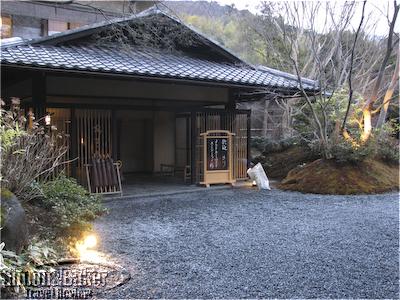
Entrance to the Ryokan Yagyu-No-Sho
Earlier this year when I was in Japan I visited Izu, an area of the country known for its hot springs. The highlight of my stay was spending the night in a luxury ryokan, a traditional Japanese hotel. My brief visit was especially rewarding and memorable for the experience itself as well as the many luxury features the ryokan offered. While the property catered mostly to Japanese customers it was part of a national alliance of luxury ryokans that facilitated bookings by international travelers.
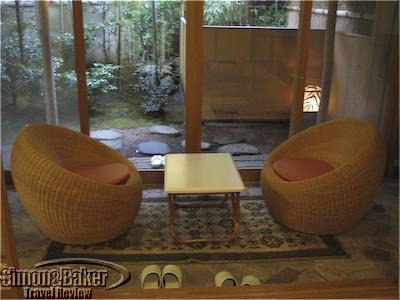
Looking out at my corner garden
In spite of steep linguistic challenges I felt welcome and would be pleased to return for a longer stay. Some of the characteristics of the ryokan I enjoyed the most were the traditional style of the facilities with flower arrangements (made by one of the owners) and artwork, manicured gardens with water features, friendly and service oriented staff, hot spring related offerings and delicious gourmet meals. There was excellent and fast complimentary WiFi connectivity in my suite, an amenity I greatly appreciated.
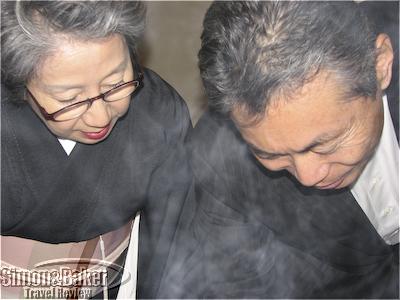
The ryokan owners preparing a meal
Yagyu-No-Sho, a traditional style ryokan with modern conveniences in the heart of a village, was owned and managed by Takashi Hasegawa and his wife. In the entrance foyer, my eyes were drawn to the wall wide bamboo forest with small birds, a beautiful artwork made of wood panels painted by a Japanese artist in her 90s who is well liked by the imperial family. In her painting, one of the staff explained, she uses only natural materials. The green in the painting was from oxidized copper and the white was from a stone.
On arriving at the ryokan we were invited to remove our shoes and wear a pair of house slippers (this was rather uncomfortable because the slippers they provided were several sizes larger than my feet and made it necessary for me to walk slowly to avoid tripping). I shed my slippers to enter my room which was covered wall to wall with tatami mats.
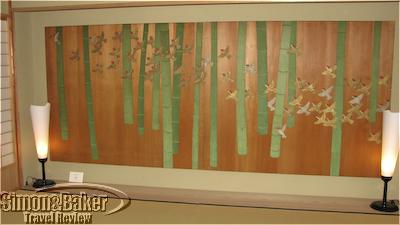
Artwork on wood panels with natural materials
My second floor room, Harvest, had a private bathroom with a separate section that housed a wood tub filled with hot springs water. The room, divided into several areas by thin paper and wood walls, was pretty and spacious. The décor was in a traditional Japanese style furnished with simple floor level chairs and tables. Instead of a bed the staff set up a sleeping area, at the end of the day, with futons, duvet blankets and feather pillows that were kept in a closet during the day. I slept very well in the comfortable floor level futon. There was a small indoor patio with Western style chairs and a table next to the room where my sleeping area was set up. Next to the patio there was an outdoor area that could be reached, while wearing special outdoor slippers, via sliding glass doors.
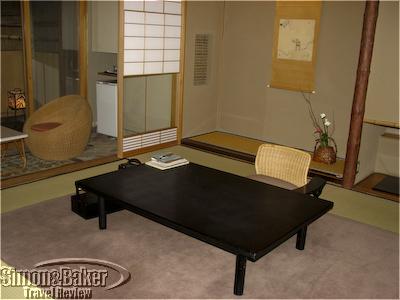
Ryokan room with traditional furnishings
The room had a living area with a low table and one cushioned armless low chair. A recessed area was home to a flower arrangement. There was also a sitting area with a low table and two chairs. Under the table there was space to rest my feet on the warm floor. To one side stood a small vanity with a mirror, tissue paper, and a cushion.
The bathroom was divided into three separate rooms. One housed a water closet with an automated Japanese heated toilet and and a mini wood sink. There was a wide room with a sink; next to it was the bath tub room which had just enough space for a large wood bath tub and a small shower area placed against the wall. The shower corner, low to the ground, consisted of a small wood stool and a handheld hose to shower thoroughly before dipping in the hot water of the tub.
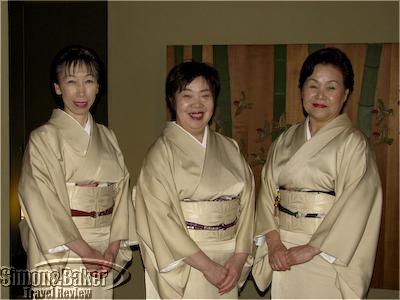
Ryokan staff in traditional dress
The temperature within the room was comfortable for me. It was controlled with a remote control. Amenities, set inside a cloth bag on the tatami floor, were: a set of Japanese pajamas, shower cap, toothbrush, hairbrush, cotton pad, cotton swabs, and hair scrunchy. There was a mini refrigerator next to the coat closet.
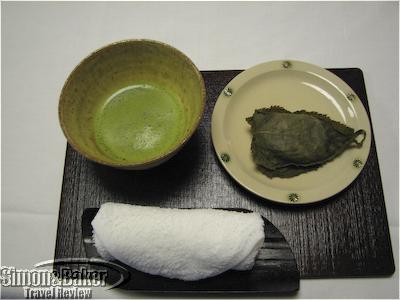
Excellent green tea
Dinner, served at 6 p.m. sharp consisted of 12 generous courses of Japanese dishes. Although it would usually have been served in individual rooms, the ryokan staff set up group seating for the six of us in one of their large rooms. To keep our hands clean we were provided with three wet towels during the course of the meal. The service began with a taste of unfermented sake as an aperitif. Meals, clearly, were an important part of the experience at this ryokan. There was a pretty dinnerware service with different dishes for the varied courses. Three ladies looked after us and served us copious quantities of delicious food.
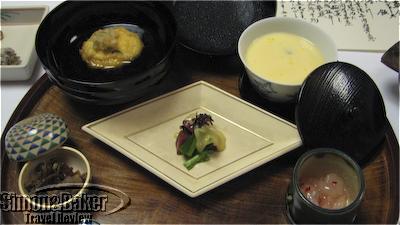
The food was attractively served and delicious
Breakfast the next morning was equally well served and as satisfying. We had rice; pickled vegetables; miso soup; beef, shiitake mushrooms and long onion cooked with a large leaf over charcoal; boiled sliced beef with a sweet soy sauce; tuna and long onion with vinegar miso; salted and fermented squid innards; deep fried tofu burger; dried fish; egg custard; sweet red bean soup with rice cake; and sherbert.
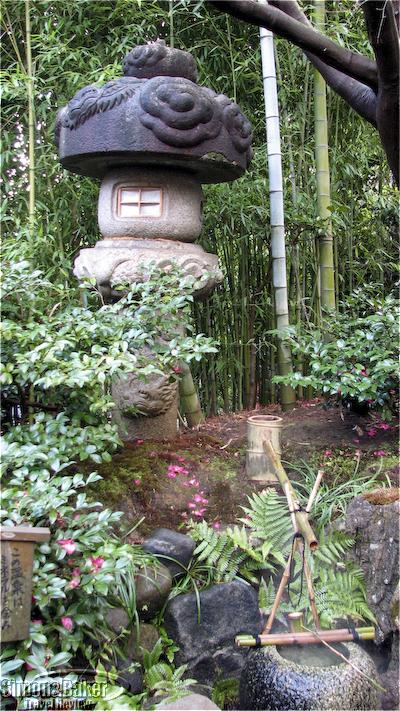
Tranquil gardens
If the opportunity presents itself I would gladly return to Yagyu-No-Sho. Next time I would request one of the ryokan’s ground floor luxury suites with indoor water features where some of my travel companions stayed. Yagyu-No-Sho, 1116-6, Shuzenji, Izu-City, Shizuoka-Prefecture, Japan, +81558724126, Fax +81558725212, http://www.yagyu-no-sho.com








